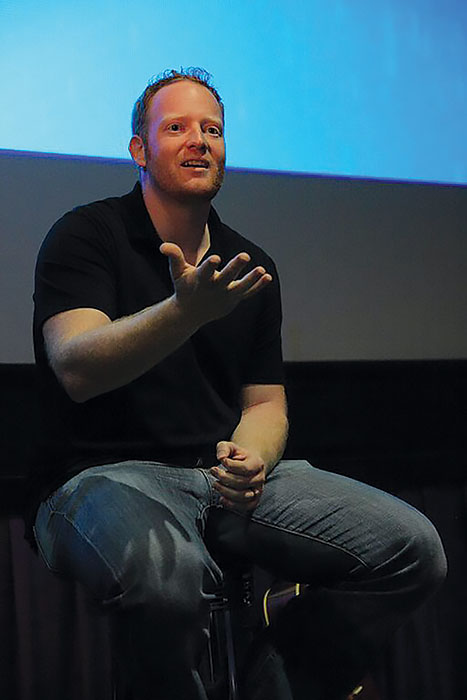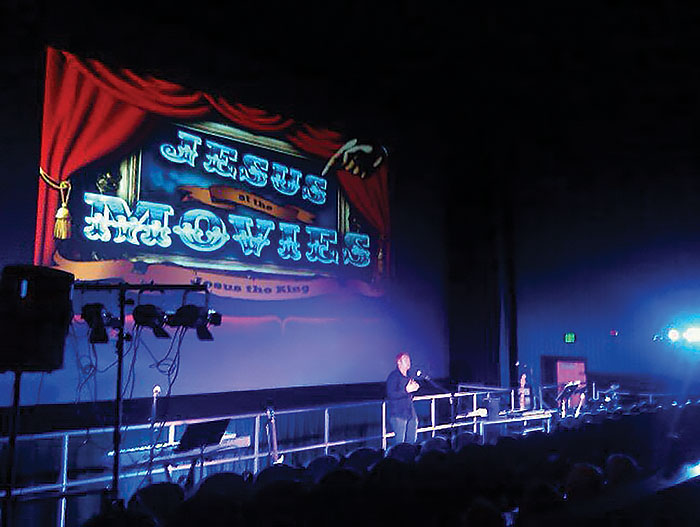
Concordia Seminary Newsroom
Proclaiming the Gospel in a digital world

Concordia Seminary, St. Louis alumnus Rev. Matt Peeples (’09) was no digital communication or social media expert when he started The Point Church in Knoxville, Tenn., five years ago.
But today his Lutheran church is sharing the Gospel far beyond its walls through the use of social media and other digital tools.

Rev. Matt Peeples (’09) uses social media and other digital tools to communicate with members and others at his church, The Point, in Knoxville, Tenn. Photo: The Point
The Point, which averages 225 worshipers each week, has a presence on Facebook, Twitter, Instagram and YouTube. The church also has its own mobile app and live streams its Sunday services.
Many of the social media platforms that are now ubiquitous in American society were just starting when Peeples attended the Seminary.
“The entire culture shifted in the four years I was in Seminary,” Peeples said. “It was the biggest shift in communication since the printing press. Luckily, I was able to change a little bit with that.”
Facebook became available to the general public in 2006, the same year Twitter was founded. As of January 2014, 74 percent of online adults used social networking sites, according to the Pew Research Center in
Washington, D.C. In June 2015, Facebook had 1½ billion monthly active users, meaning 1 in every 7 people in the world used the platform to connect with family, friends and brands. While the iPhone wasn’t released until 2007, today 9 out of every 10 U.S. adults have a cellphone, and the majority of them own a smartphone.
That means for most American adults, access to social networking is usually within an arm’s reach.
At The Point, which meets in a temporary location at the Regal Cinema at the West Town Mall, social media is as much a part of the church as a Sunday morning bulletin.
“We invested more in our digital side, because we were portable,” Peeples said.
He is grateful that while he was in church planter training and starting The Point, his wife, Liza, was working with professional Facebook pages. She created the church’s Facebook page and helped The Point establish an online community.
“All of a sudden, [Facebook] wasn’t just a place for us to share what we were doing,” he said. “This started to become a platform for interacting with people, and a platform where those interactions started leading to Baptisms.
“It was exciting.”
The church now shares photos, videos, events and inspiring messages across its social media channels.
One recent Twitter message read: “You have incredible purpose and God has a plan for you. For YOU. How’s that for beating a bad case of the Mondays?”
On The Point’s five-year anniversary in August, the church posted photos from a birthday service and celebration with the message: “Happy Birthday to The Point! We love our Point fam, the Regal, and the Knoxville community – cheers to 5 more impactful, Spirit-filled years!”
One man replied: “Great day as usual at The Point! 5 years goes fast when [you’re] doing good things!”
Since it began, The Point has experimented with digital and mobile tools.
Each Sunday the church invites attendees to text questions to church leaders during services. The open invitation for anonymous and honest questions has become a vital part of the church’s culture.
The Point recently began streaming its services, allowing people who are unable to attend in person to hear the weekly message from their computers or mobile devices.
Anywhere from 50 to 100 people tune in to worship via the live stream weekly. Peeples said he heard of a church in China gathering around The Point’s messages and of a man who could not sleep but who was able to “have church” and find peace at 4 in the morning.

The Point Church meets in a movie theater in Knoxville, Tenn. The church invites attendees
to text questions to church leaders. Photo: The Point
“The Good News of Jesus is so awesome that we wanted to give people as many opportunities as possible to connect to it,” said Casey Kegley, the church’s vicar and a Concordia Seminary student. Peeples said that being available as a pastor and a church on digital platforms creates a host of opportunities. People are able to experience The Point — messages, conversations, people, events — in a nonthreatening way.
Social media also gives The Point another opportunity to respond when people reach out. One example: Peeples sends a personal message whenever somebody new interacts with The Point through their social networks.
“When we follow up with people who have checked in with us for the first time, we usually get responses that include questions and deeper curiosity about what goes on at The Point,” Kegley said.
In-person interactions often follow, he said, and those interactions tend to be deeper because of the prior connection through social media.
Peeples’ own experience and the advice of his mentors have taught him to keep the goal of personal relationships in focus when using digital tools.
“The only way social media accounts are going to yield anything is if you use them to interact with people,” he said. “Realize that these platforms will be helpful, but you really want to let people know how they can meet you in person.
“If you’re going to be high-tech, make sure you’re also high-touch.”
When it comes to digital platforms, Peeples said church leaders should feel free to take the crawl-walk-run approach. He said they should not expect to use all platforms perfectly from day one, but should simply
begin and learn as they go.
One method that has worked well for The Point is involving memberswho are personally active on social media to help the church develop content. This approach spreads the work around and keeps each person’s time commitment to a minimum.
By creating a team of people to help, Peeples finds himself free to interact with The Point’s social media just a
few times a week or at specific times when something needs his attention.
Doing ministry in the modern digital age continues to be a learning experience for Peeples and The Point.
Peeples said he feels empowered by the ministry foundation he gained at Concordia Seminary.
“I truly believe Lutheran theology is the best theology for reaching the lost,” he said.
Peeples said he loves sharing the Lutheran perspective of grace, the commitment to answering questions about God the way God Himself answers those questions and the freedom to do outreach in all kinds of places — the digital world included.